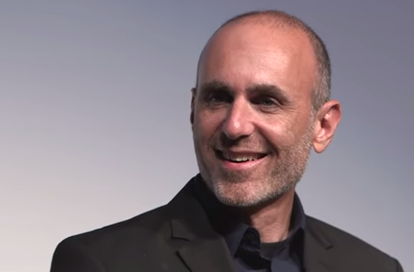Norman Oppenheimer, the main character in Israeli director Joseph Cedar’s first English-language film, Norman: The Moderate Rise And Tragic Fall Of A New York Fixer, is a man in motion.

People think they know Norman, yet no one really knows him. He’s omnipresent, yet he’s elusive. Norman reminds a viewer of Jay Gatsby, the alluring and mysterious figure in F. Scott Fitzgerald’s novel, The Great Gatsby.
Norman, screened at the 2016 Toronto International Film Festival, takes us into the realm of New York wheeler-dealers and machers and a rising Israeli politician.
Norman, played by Richard Gere, is a “consultant,” always ready to offer his “services.” Clad in a camel-hair coat, scarf and hat, with a black leather bag slung around his shoulder, he moves in moneyed circles and devotes himself to enriching himself and his partners.
The film opens in the midst of a Manhattan winter as Norman tries to make a killing by selling what he calls “tax receivables.” An indefatigable hustler, he finds his latest prey in the person of Misha Eshel (Lior Ashkenazi), the deputy Israeli minister of trade and labor who’s in New York on a mission. Eshel seems like a spent force. “I’m already washed up,” he says with resignation.
Norman disagrees with his appraisal. Working on the assumption that Eshel is on his way up in Israeli politics, Norman ingratiates himself by buying him an expensive pair of shoes. Norman believes it’s a smart investment that could pay handsome dividends in the future.

Norman is taking a risk, since he’s cash-starved. In a revealing scene which speaks volumes about his financial condition, he “dines” on jarred herring and crackers in a dingy church basement. Gere, a seasoned Hollywood actor, effectively portrays him as a loser who masquerades as a winner.
Norman’s hunch about Eshel turns out to be correct. Three years later, Eshel returns triumphantly to New York City as Israel’s new prime minister. Norman shows up at Eshel’s reception, and Eshel hugs him in a gesture of affection.
Eshel has big plans. He’s preparing the ground for a “historic compromise” with Israel’s Arab neighbors. Eshel’s right-wing opponents in the Knesset oppose his vaunted peace proposal. Soon, however, he’s embroiled in a bribery scandal that threatens his ambitious plan as well as his coalition government.
In the meantime, Norman is up to his ears in another matter. Rabbi Blumenthal (Steve Buscemi) needs an infusion of funds to save his synagogue from closing, and Norman, an old friend, steps in to lend a helping hand.
Being a do-gooder, Norman offers to assist Eshel, too. Whether he can actually be of assistance is a moot point. Eshel’s cynical aide, Dubi (Yehuda Almagor), warns Norman to “lay off.” The prime minister, he says cruelly, is not your friend. In Dubi’s harsh estimation, Norman is nothing but a “delusional name-dropper” and a “strategic threat” to Israel.
It seems clear that Eshel intends to blame Norman for the scandal. Everybody needs a scapegoat, and as Norman will doubtless learn, politics is rife with hypocrisy and double-dealing. Ashkenazi puts on a convincing performance as a slick politician who will do virtually anything to save his skin.
Norman, a competently crafted film that straddles the line between reality and fantasy, is a wry parable that delves into the nether world of fast-talking fixers and glad-handing politicians.